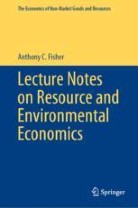
About this book series
Free market economies dominate the world economic order, yet this dominance throws into sharp relief the importance to sustainable economic growth of those goods and resources which lie beyond the immediate remit of the market. Such items are often not directly incorporated within the pricing system which is the hallmark of a marketed good. Yet the smooth and sustained operation of the market depends upon the correct valuation and management of non-market goods such as those provided by the environment or via public expenditure. This broad category includes a diversity of goods ranging from recreation in open-access wilderness areas to health and safety improvements and across resources as different as the global climate system, the ozone layer and clean water. These are the goods and resources which determine so much of the quality of life and upon which the sustainable continuance not only of the market system but life itself depends.
Concerns regarding the manner in which non-market goods are incorporated within economic decision-making form the basic rationale for this series of books from Springer. The series combines and contrasts perspectives from environmental, ecological and resource economics to address two themes; the first examining the ways in which economists assess the value of non-market goods; the second looking at approaches to the sustainable use and management of such goods. Books are commissioned under both of these themes, details of which are
as follows:Theme 1: Valuing Preferences for Non-Market Goods and Resources
Here volumes will include state of the art reviews and technical manuals examining a range of techniques including the following:
- Valuing Environmental Preferences: Stated Preference Methods such as Choice Modelling and Contingent Valuation;
- Valuing Environmental Preferences: Revealed Preference Methods such as Travel Cost and Hedonic Pricing approaches;
- Experimental Approaches to the Evaluation of Environmental Preferences;
- Qualitative Approaches to the Evaluation of Environmental Preferences;
- Benefits Transfers.
Extending the issues raised by the above allows consideration of a wide diversity of application issues tackled in further volumes.
Theme 2: Sustainable Management and Decision-Making for Non-Market
Goods and ResourcesThis theme aims to bridge the gap between expert analysts and decision-makers through a series of volumes examining the management of environmental and other non-markets goods within the constraints of sustainable development. These books also examine the decision frameworks within which the valuation techniques discussed under Theme 1 are applied. Volumes address both project appraisal methodologies including the following:
- Print ISSN
- 1571-487X
- Series Editor
-
- Ian J Bateman
Book titles in this series
-

-
A Primer on Nonmarket Valuation
- Editors:
-
- Patricia A. Champ
- Kevin J. Boyle
- Thomas C. Brown
- Copyright: 2017
Available Renditions
- Hard cover
- Soft cover
- eBook

-
Benefit Transfer of Environmental and Resource Values
A Guide for Researchers and Practitioners
- Editors:
-
- Robert J. Johnston
- John Rolfe
- Randall S. Rosenberger
- Roy Brouwer
- Copyright: 2015
Available Renditions
- Hard cover
- Soft cover
- eBook

-
Valuing Oil Spill Prevention
A Case Study of California’s Central Coast
- Authors:
-
- Richard T. Carson
- Michael B. Conaway
- W. Michael Hanemann
- Jon A. Krosnick
- Copyright: 2004
Available Renditions
- Hard cover
- Soft cover
- eBook

-
A Primer on Nonmarket Valuation
- Editors:
-
- Patricia A. Champ
- Kevin J. Boyle
- Thomas C. Brown
- Copyright: 2003
Available Renditions
- Hard cover
- Soft cover
- eBook

Abstracted and indexed in
-
- Norwegian Register for Scientific Journals and Series
